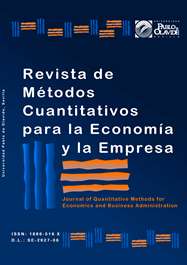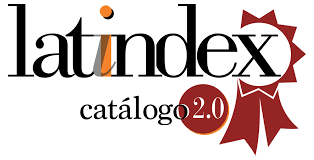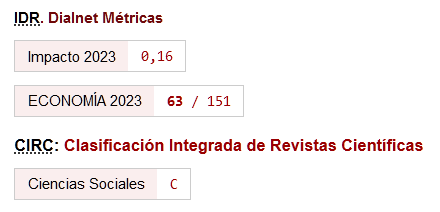Creación de un índice de movilidad para rankings de hoteles
DOI:
https://doi.org/10.46661/revmetodoscuanteconempresa.3060Palabras clave:
TripAdvisor, ranking, hoteles, movilidad, minería de datosResumen
Los rankings de hoteles ejercen gran influencia sobre los turistas a la hora de elegir un hotel. Los hoteleros también se esfuerzan por aparecer en lo más alto de la clasificación. Sin embargo, la evolución de estos rankings a lo largo del tiempo ha sido poco estudiada, por lo que es necesario profundizar en su análisis debido a las importantes implicaciones que tiene para los empresarios. ¿Permanecen los hoteles en las mismas posiciones o por el contrario experimentan grandes cambios en la clasificación? Este trabajo trata de aportar nuevas herramientas para el análisis de estos rankings con la creación de un índice que mide la movilidad de un hotel en el ranking de su ciudad. Se aplicará el modelo a una muestra de 727 hoteles con datos extraídos de Tripadvisor en cinco ciudades españolas (Barcelona, Madrid, Sevilla, Valencia y Zaragoza).
Descargas
Citas
Ayeh, J. K., Au, N., & Law, R. (2013). “Do we believe in TripAdvisor?” Examining credibility perceptions and online travelers’ attitude toward using user-generated content. Journal of Travel Research, 52(4), 437-452.
Biffaro, L. (2015). Unfair Commercial Practices and Online Consumer Reviews: the Italian Tripadvisor Case. Rivista Italiana di Antitrust/Italian Antitrust Review, 2(1), 181-185.
Box, G.E.P., Jenkins, G.M., Reinsel, G.C., & Ljung, G.M. (2015). Time Series Analysis: Forecasting and Control, 5th Ed. New York: Wiley.
Budria, S. (2010). Schooling and the distribution of wages in the European private and public sectors. Applied Economics, 42(8), 1045-1054.
Callarisa-Fiol, L.J., Sánchez-García, J., Moliner, M.Á., & Forgas-Coll, S. (2012). La importancia de las comunidades virtuales para el análisis del valor de marca. El caso de Tripadvisor en Hong Kong y París. Papers de turisme, 54, 89-115.
Chen, Y.F., & Law, R. (2016). A Review of Research on Electronic Word-of-Mouth in Hospitality and Tourism Management. International Journal of Hospitality & Tourism Administration, 17(4), 347-372.
Deeg, D.J. (2002). Attrition in longitudinal population studies: Does it affect the generalizability of the findings? Journal of Clinical Epidemiology, 55(3), 213-215.
Durán, P. (2005). Los datos perdidos en estudios de investigación ¿son realmente datos perdidos? Archivos argentinos de pediatría, 103(6), 566-568.
Eco, U. (2011). El vértigo de las listas. IC Revista Científica de Información y Comunicación, 8, 15-34.
Engels, J. M., & Diehr, P. (2003). Imputation of missing longitudinal data: a comparison of methods. Journal of Clinical Epidemiology, 56(10), 968-976.
EC-European Commission (2014). Study on Online Consumer Reviews in the Hotel Sector. Final report. Recuperado de: http://bookshop.europa.eu/en/study-on-online-consumer-reviews-in-the-hotel-sector-pbND0414464/
Filieri, R., Alguezaui, S., & McLeay, F. (2015). Why do travelers trust TripAdvisor? Antecedents of trust towards consumer-generated media and its influence on recommendation adoption and word of mouth. Tourism Management, 51, 174-185.
Ghose, A., Ipeirotis, P.G., & Li, B. (2012). Designing Ranking Systems for Hotels on Travel Search Engines by Mining User-Generated and Crowdsourced Content. Marketing Science, 31(3), 493–520.
González, S.M., Gidumal, J.B., & López-Valcárcel, B.G. (2010). La participación de los clientes en sitios web de valoración de servicios turísticos. El caso de Tripadvisor. Revista de Análisis Turístico, 10, 17-22.
Hensens, W. (2010). The reliability of data from guest reviews on Tripadvisor as a contemporary social media platform. Paper submitted and presented at SAIMS 2010 in Mpekweni Resort.
Instituto Nacional de Estadística (2015). Cifras oficiales de población de los municipios españoles: Revisión del Padrón Municipal. Madrid: Ministerio de Economía y Empresa. Recuperado de: https://www.ine.es/dyngs/INEbase/es/categoria.htm?c=Estadistica_P&cid=1254734710990
Jeacle, I., & Carter, C. (2011). In TripAdvisor we trust: Rankings, calculative regimes and abstract systems. Accounting, Organizations and Society, 36(4), 293-309.
Jenkins, S.P., Brandolini, A., Micklewright, J. Nolan, B., & Basso, G. (2012). The Great Recession and its consequences for household incomes in 21 countries. En Jenkins, S.P., Brandolini, A., Micklewright, J., & Nolan, B. (eds.). The Great Recession and the Distribution of Household Income. Oxford: Oxford University Press, pp.33-89.
Jurca, R., Garcin, F., Talwar, A., & Faltings, B. (2010). Reporting incentives and biases in online review forums. ACM Transactions on the Web, 4(2), 1-27.
Kladou, S., & Mavragani, E. (2015). Assessing destination image: An online marketing approach and the case of TripAdvisor. Journal of Destination Marketing & Management, 4(3), 187-193.
Kirchgässner, G., Wolters, J., & Hassler, U. (2013) Introduction to Modern Time Series Analysis. Berlin: Springer-Verlag.
Kwok, L., Xie, K. L., & Richards, T. (2017). Thematic framework of online review research: A systematic analysis of contemporary literature on seven major hospitality and tourism journals. International Journal of Contemporary Hospitality Management, 29(1), 307-354.
Lee, H. A., Law, R., & Murphy, J. (2011). Helpful reviewers in TripAdvisor, an online travel community. Journal of Travel & Tourism Marketing, 28(7), 675-688.
Mateos, J. C., Martín, M.A.R., & Martín-Velicia, F. A. (2014). Disrupción en el uso de la web 2.0 en los hoteles independientes. Cultura, desarrollo y nuevas tecnologías: VII Jornadas de investigación en turismo, 169-183.
Melián, S., Bulchand, J., & González, B. (2010). La participación de los clientes en sitios web de valoración de servicios turístico. El caso de TripAdvisor. Análisis Turístico, 10, 17-22.
Mellinas, J. P., Martínez, S.M., & Bernal, J.J. (2015). Booking.com: The unexpected scoring system. Tourism Management, 49, 72-74.
Miguéns, J., Baggio, R., & Costa, C. (2008). Social media and tourism destinations: TripAdvisor case study. Advances in Tourism Research, 26(28), 1-6.
Milanovic, B. (2015), Global Inequality of Opportunity: How Much of Our Income Is Determined by Where We Live? The Review of Economics and Statistics, 97(2), 452-460.
Mills, T.C. (2011). The foundations of modern time series analysis. Basingstoke, U.K.: Palgrave, McMillan.
Molinillo, S., Ximénez-de-Sandoval, J. L., Fernández-Morales, A., & Coca-Stefaniak, A. (2016). Hotel assessment through social media: the case of TripAdvisor. Tourism & Management Studies, 12(1), 15-24.
O’Connor, P. (2008). User-generated content and travel: A case study on Tripadvisor.com. In: O’Connor P., Höpken W., Gretzel U. (eds), Information and Communication Technologies in Tourism 2008. Springer, Vienna.
O'Connor, P. (2010). Managing a hotel's image on TripAdvisor. Journal of Hospitality Marketing & Management, 19(7), 754-772.
O’Mahony, M.P., & Smyth, B. (2009). Learning to recommend helpful hotel reviews. Proceedings of the third ACM conference on Recommender systems - RecSys ’09, 305.
Ong, B. S. (2012). The Perceived Influence of User Reviews in the Hospitality Industry. Journal of Hospitality Marketing & Management, 21(5), 463-485.
Ott, M., Cardie, C., & Hancock, J. (2012). Estimating the Prevalence of Deception in Online Review Communities. Proceedings of the 21st international conference on World Wide Web WWW 12, 201-210.
Río, C., Gradín, C., & Cantó, O. (2011). The Measurement of Gender Wage Discrimination: The Distributional Approach Revisited. The Journal of Economic Inequality, 9(1), 57-86.
Scott, S.V, & Orlikowski, W. J. (2012). Reconfiguring relations of accountability: Materialization of social media in the travel sector. Accounting, Organizations and Society, 37(1), 26-40.
Smyth, P.C.B., Wu, G., & Greene, D. (2010). Does TripAdvisor makes hotels better? Derek Greene School of Computer Science & Informatics, University College Dublin Belfield.
Sotiriadis, M.D. (2017). Sharing tourism experiences in social media: A literature review and a set of suggested business strategies. International Journal of Contemporary Hospitality Management, 29(1), 179-225.
TripAdvisor (2016).Changes to the Tripadvisor Popularity Ranking Algorithm. Recuperado de: https:// www.tripadvisor.com/TripAdvisorInsights/n2701/ changes-tripadvisor- popularity-ranking-algorithm
Tuominen, P. (2011). The influence of TripAdvisor consumer-generated travel reviews on hotel performance. University of Hertfordshire Business School Working Paper.
Twisk, J., & De Vente, W. (2002). Attrition in longitudinal studies: how to deal with missing data. Journal of Clinical Epidemiology, 55(4), 329-337.
Vásquez, C. (2011). Complaints online: The case of TripAdvisor. Journal of Pragmatics, 43(6), 1707-1717.
Xiang, Z., & Gretzel, U. (2010). Role of social media in online travel information search. Tourism Management, 31(2), 179-188.
Publicado
Cómo citar
Número
Sección
Licencia
Derechos de autor 2019 Revista de Métodos Cuantitativos para la Economía y la Empresa

Esta obra está bajo una licencia internacional Creative Commons Atribución-CompartirIgual 4.0.
El envío de un manuscrito a la Revista supone que el trabajo no ha sido publicado anteriormente (excepto en la forma de un abstract o como parte de una tesis), que no está bajo consideración para su publicación en ninguna otra revista o editorial y que, en caso de aceptación, los autores están conforme con la transferencia automática del copyright a la Revista para su publicación y difusión. Los autores retendrán los derechos de autor para usar y compartir su artículo con un uso personal, institucional o con fines docentes; igualmente retiene los derechos de patente, de marca registrada (en caso de que sean aplicables) o derechos morales de autor (incluyendo los datos de investigación).
Los artículos publicados en la Revista están sujetos a la licencia Creative Commons CC-BY-SA de tipo Reconocimiento-CompartirIgual. Se permite el uso comercial de la obra, reconociendo su autoría, y de las posibles obras derivadas, la distribución de las cuales se debe hacer con una licencia igual a la que regula la obra original.
Hasta el volumen 21 se ha estado empleando la versión de licencia CC-BY-SA 3.0 ES y se ha comenzado a usar la versión CC-BY-SA 4.0 desde el volumen 22.










